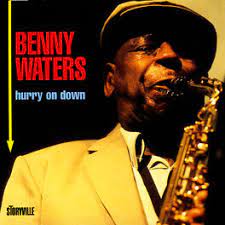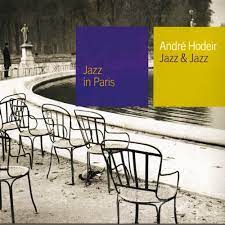
Three Wishes
Baroness de Koenigswarter presented Eddie Thompson with the inquiry of three wishes and he responded by telling her:
- “I wish I could jump off the Brooklyn Bridge and make it! You want a serious wish? I wish I could make a record album I’d be satisfied with.”
- “Oh God, this is hellishly difficult! I wish I could live like a millionaire. I don’t want to be one. I want to live like one.”
- “I hope I’ll still be playing when I’m a hundred.”
More Posts: baroness,history,instrumental,jazz,music,pannonica,piano,three,wishes

Daily Dose Of Jazz…
Lenny McBrowne was born Leonard Louis McBrowne in Brooklyn, New York on January 24, 1933. Influenced by his drummer father Arnold he took up drums at a young age, playing in street marching bands between ages 12 and 15, while also taking lessons on the bass. Graduating high school in 1951 he studied under Max Roach for one year and Sticks Evans.
McBrowne began his professional career in Pete Brown’s group, which featured Paul Bley. He also played with Randy Weston and Cecil Payne in various Brooklyn clubs, and with Paul Bley’s Trio in Montreal, Quebec, Canada. By 1956 he was playing with Tony Scott in New York City, and continued performing with Paul Bley in a college tour that led to his relocation to California.
His first West Coast dates included the likes of Billie Holiday, Sonny Stitt, Harold Land, Benny Golson, Curtis Fuller, Fred Katz and Sonny Rollins. 1959 saw Lenny forming his own group, The Four Souls, with pianist Terry Trotter, bassist Herbie Lewis, tenor saxophonist and composer Daniel Jackson, and trumpeter Donald Sleet.
Between January and March 1960, The band recorded their debut album Lenny McBrowne and the 4 Souls in 1960 that was released by Pacific Jazz Records. Shortly after they relocated to New York City and recorded their second and final album Eastern Lights with Jimmy Bond on bass. Cannonball Adderley was the producer and supervisor and the album was released by Riverside Records.
Described as a highly close-knit and well-rehearsed combo with fluid and competent soloing by several leading jazz magazines, the group was destined for dissolution. Lenny then free-lanced with Sal Salvador, Chris Connor and Carmen McRae. During the 1960s, he played with Sarah Vaughan, Lambert, Hendricks & Bavan, Randy Weston, Booker Ervin, Ray Bryant, Teddy Wilson, and toured Japan with Thelonious Monk.
In the second half of the 1960s, McBrowne played primarily with Ervin’s band. He then relocated to San Francisco, California and began to perform with Kenny Burrell on a regular basis until 1976, when he made his last recording. Hard bop and soul jazz drummer Lenny McBrowne transitioned on October 4, 1980 at 47 in San Francisco, California.
More Posts: bandleader,drums,history,instrumental,jazz,music

Daily Dose Of Jazz…
Benjamin Waters was born on January 23, 1902 in Brighton, Baltimore, Maryland. He began on organ, then switched to clarinet and later added saxophone. The first band he joined in 1918 was Charly Miller’s band. In 1922 he attended the New England Conservatory of Music where he gave lessons to Harry Carney.
From 1926 until 1931, Waters was a member of Charlie Johnson’s band. He would later work with King Oliver, Fletcher Henderson, Claude Hopkins, and others. During these years he made several recordings with King Oliver and Clarence Williams.
In the years 1941 and 1942 he played with the Jimmie Lunceford Orchestra, and later in the 1940s with Roy Milton. He went on to form his own band, playing at the Red Mill in New York City. After this stint in the city he moved to California for four years.
From 1952 to 1992 Benny lived in Paris, France. In 1996, he received the Legion of Honour from the French Ministry of Culture. He continued to perform regularly up to his 95th birthday.
Saxophonist and clarinetist Benny Waters, who became blind in 1992 due to cataracts, transitioned on August 11, 1998 in Columbia, Maryland.
More Posts: bandleader,clarinet,history,instrumental,jazz,music,saxophone

Requisites
The Young Bloods ~ Phil Woods and Donald Byrd | By Eddie Carter
This morning’s choice from the library brings together two of my favorite musicians for a quintet jam session, Phil Woods and Donald Byrd. The Young Bloods (Prestige LP 7080) is a 1957 release reuniting altoist Phil Woods, trumpeter Donald Byrd and bassist Teddy Kotick who appeared together on Jazz For The Carriage Trade a year earlier. Al Haig on piano and Charlie Persip on drums round out the ensemble. My copy is the 2022 Analogue Productions US Mono Audiophile reissue (Prestige PRLP 7080).
The opener, Dewey Square by Charlie Parker, takes off right out of the gate with Haig’s introduction segueing into the ensemble’s melody. The song takes its title from the Harlem hotel where Parker and other musicians resided during the forties. Donald leads off with a cooking opening solo; then, Al continues swinging in the second reading. Phil blows up a storm with a lengthy statement, succeeded by Charlie’s enthusiastic exchange with the front line ahead of the climax. Dupeltook, the first of four from Phil Woods, begins with a danceable theme by the ensemble. Woods is up first and manages the opening statement efficiently. Byrd grabs us by the ears with an inspired improvisation, then Haig hits a scintillating groove. Persip, Woods, and Byrd share a final conversation leading to the ending.
Once More, a relaxing blues by Woods opens with the front line moving in unison on the melody. Phil leads off with a marvelous opening reading. Donald delivers a pleasant presentation of sheer enjoyment; next, Al says some exciting things in his statement. Teddy walks a few bass lines toward the quintet’s theme reprise and climax. House of Chan is Woods’ dedication to his wife, Chan Parker, who initially was the common-law wife of Charlie Parker. The horns establish the medium theme together; Woods gets a good thing going in the opening statement. Byrd takes a few fine choruses in the second solo. Haig responds with a gorgeous bounce in the third reading, and Persip wraps it up in a brief exchange with Woods and Byrd preceding the group’s exit.
Phil’s final tune is In Walked George, named for pianist George Wallington. The front line sets the stage for the ensemble’s collective melody. Byrd takes the opening solo with a delightful interpretation, and woods follows with a statement as light as a fall breeze. Al puts the joyously cheerful exclamation point on the song ahead of the closing chorus and climax. Lover Man, by Jimmy Davis, Roger Ramirez, and James Sherman, receives a warm tribute by the quintet. Al opens the standard with a tender introduction segueing into a lovely melody and lead solo by Phil that takes your breath away. Donald expresses care and thoughtfulness in the second reading, followed by Al, who delivers a delicately graceful finale before the ensemble takes the song out softly.
Bob Weinstock supervised the initial recording of The Young Bloods, and Rudy Van Gelder was behind the dials. Kevin Gray mastered this audiophile reissue, and the sound quality is fantastic. The musicians emerge from your speakers with superb clarity. The record is 180 grams of audiophile vinyl that’s silent until the music starts, and the album jacket has a high gloss worthy of displaying on the wall. The Young Bloods is an excellent album that one can enjoy any time of the day or evening. If you’re looking for a great Hard-Bop album and are a fan of Phil Woods and Donald Byrd, The Young Bloods is a title you should seriously consider for a spot in your library!
~ Lover Man – Source: JazzStandards.com © 2023 by Edward Thomas Carter
More Posts: choice,classic,collectible,collector,history,instrumental,jazz,music,saxophone,trumpet

Daily Dose Of Jazz…
André Hodeir was born January 22, 1921 in Paris, France and trained as a classical violinist and composer. He studied at the Conservatoire de Paris, where he was taught by Olivier Messiaen and won first prizes in fugue, harmony, and music history. While pursuing these studies he discovered jazz and various music forms besides jazz and classical. He recorded on violin under the pseudonym Claude Laurence.
In 1954 he was a founder and director of Jazz Groupe de Paris, which included Bobby Jaspar, Pierre Michelot and Nat Peck. In 1957, at the invitation of Ozzie Cadena of Savoy Records, he recorded an album of his compositions with Donald Byrd, Idrees Sulieman, Frank Rehak, Hal McKusick, Eddie Costa, George Duvivier, and Annie Ross.
In addition to two books of Essais (1954 and 1956), he wrote film scores, including Le Palais Idéal by Ado Kyrou for the film Chutes de pierres, danger de mort by Michel Fano, and Brigitte Bardot’s Une Parisienne.
He founded an orchestra during the Sixties and composed a work based on the Anna Livia Plurabelle story from the novel Finnegans Wake by James Joyce. Violinist, composer, arranger and musicologist André Hodeir transitioned on November 1, 2011.
More Posts: arranger,bandleader,composer,history,instrumental,jazz,music,musicologist,violin




